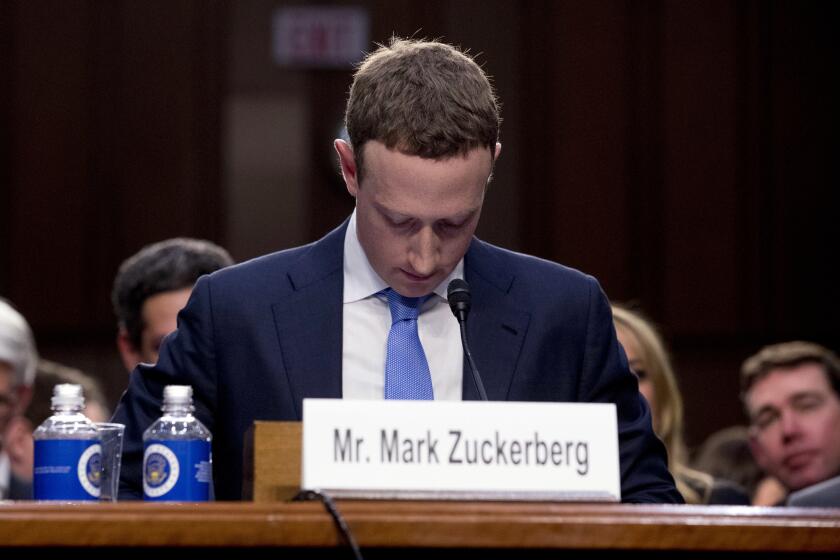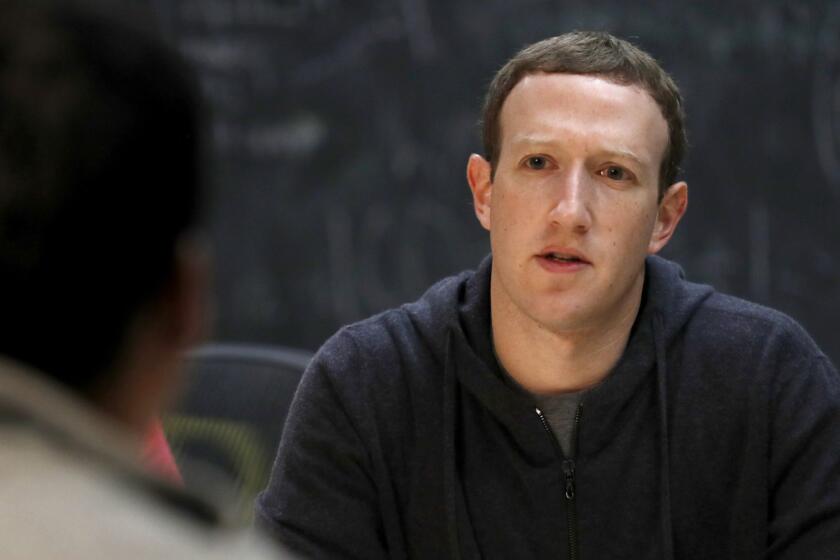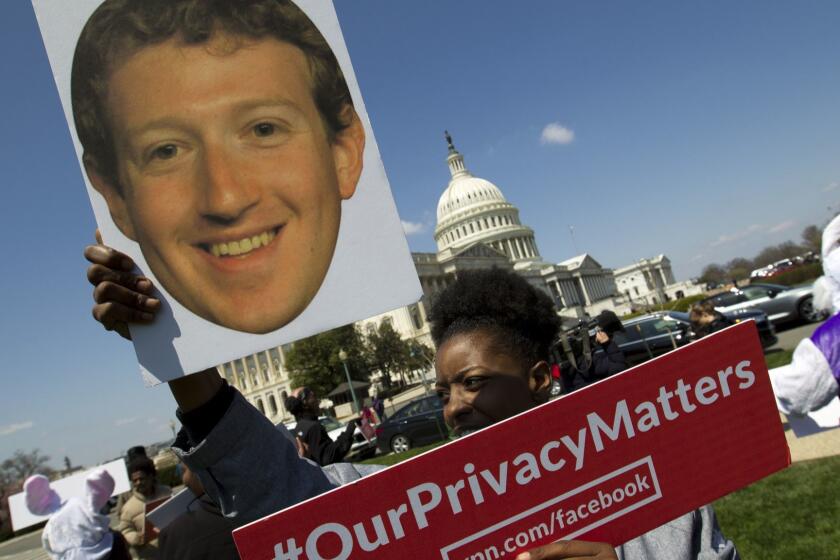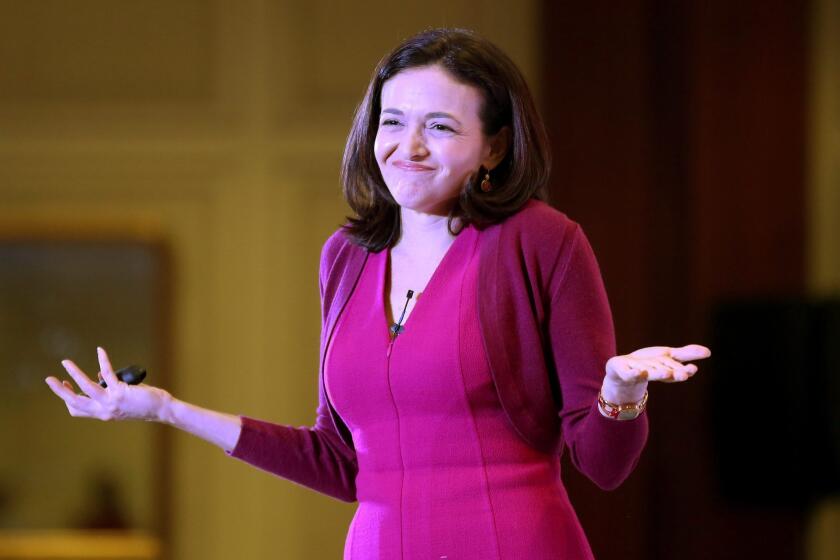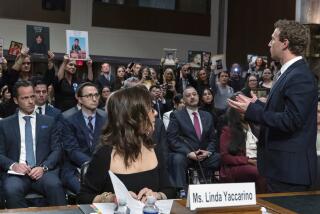Column: Facebook still turning a blind eye to hate speech
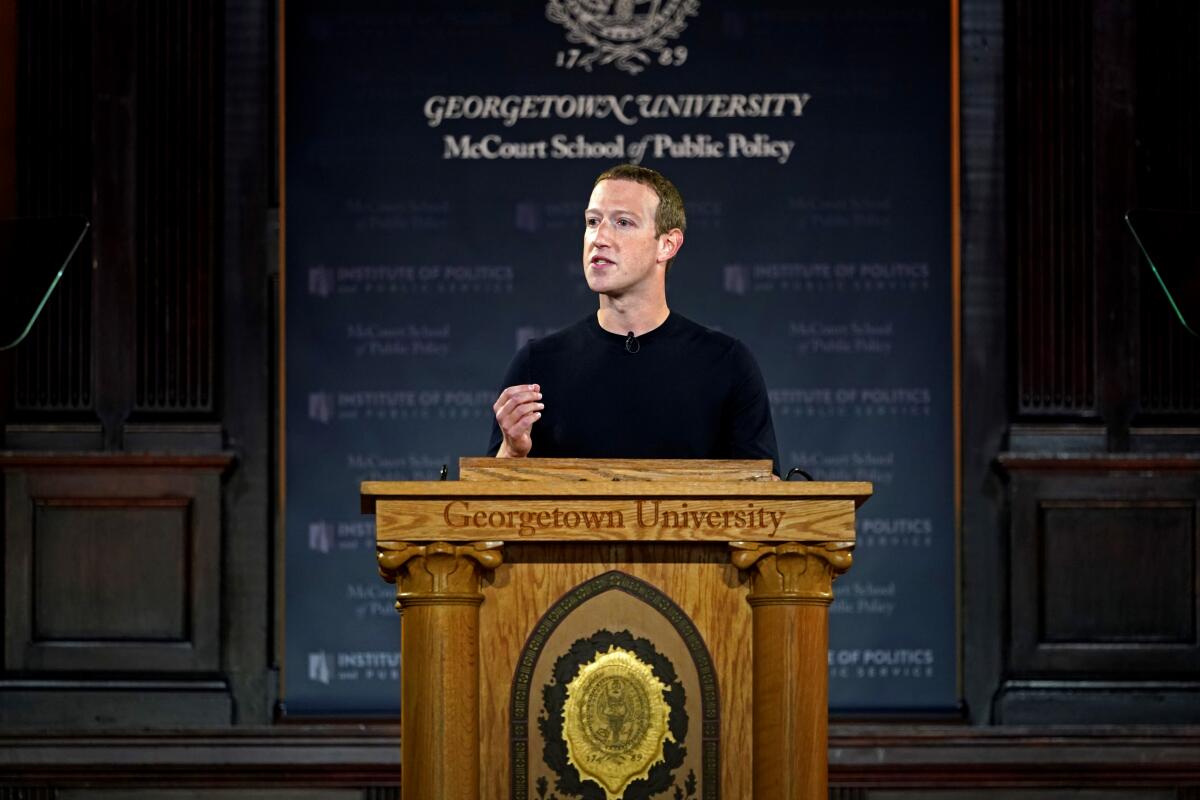
Jonathan Greenblatt, the chief executive and national director of the Anti-Defamation League, was not all that optimistic in advance of the online meeting that Facebook CEO Mark Zuckerberg and COO Sheryl Sandberg had set up with him and the heads of other civil rights groups last Tuesday.
Many of them had been talking to Facebook about its tolerance of hate groups and racist and anti-Semitic postings on the giant social media company’s website.
For the record:
12:49 p.m. July 11, 2020This column originally gave the name of the co-CEO of the advocacy group Free Press as Jennifer González. Her name is Jessica González.
They had submitted 10 recommendations they said could result immediately in “real progress.” Facebook had stated that it takes “a zero tolerance approach” to hateful posts on its services by removing them.
We’re talking about literally the most sophisticated advertising platform in the history of capitalism. The idea that they can’t find the Nazis on their platform is just laughable.
— Jonathan Greenblatt, Anti-Defamation League
Yet the very morning of the meeting, ADL’s researchers turned up a posting on Facebook from a group headed “Exposing the Rothschilds,” which was “filled with grotesque anti-Semitic conspiracies,” Greenblatt told me.
“They were the kind that motivated Robert Bowers to shoot up the synagogue in Pittsburgh, the kind that motivated the shooter in Poway,” Greenblatt says.
(He was referring to the October 2018 massacre at the Tree of Life synagogue in which Bowers is charged with killing 11 people and wounding six, and the April 2019 rampage at a synagogue in a San Diego suburb in which John T. Earnest is accused of killing one person and wounding three others. Bowers and Earnest are both awaiting trial and face the death penalty.)
Mark Zuckerberg’s cluelessness shows how socially dangerous Facebook has become.
“The group had 133,000 members, right out there in the open,” Greenblatt says. Things only got more dispiriting that day, as Zuckerberg and Sandberg essentially fobbed the group off with what they considered to be empty promises to take their concerns under advisement.
“We thought we’d talk about commitments and timetables” for implementing the recommendations, he says. “We didn’t get anything of the sort.”
That’s a bad look for Facebook, coming at an especially delicate moment for the $71-billion company.
Companies ranging from small businesses to some of its largest corporate clients have suspended their advertising on Facebook sites for the month of July in response to a boycott campaign initiated by civil rights groups, including the ADL.
Meanwhile, an independent civil rights auditor completed her three-year investigation with a blistering final report, published the day of the meeting, that percolated with exasperation.
Although Facebook had made “significant improvements” in dealing with civil rights issues on its main platform, wrote the auditor, former ACLU official Laura W. Murphy, “we have also watched the company make painful decisions over the last nine months with real world consequences that are serious setbacks for civil rights.”
Among them was a decision to tolerate misinformation from politicians, including President Trump, whose posts falsely claiming that mail-in ballots were illegally distributed in some states Facebook refused to take down. Facebook also failed to take action against Trump posts that seemed to threaten official violence against protesters of police racism and brutality.
Back at the time of Facebook’s initial public offering in 2012, I advised its new stockholders: “Congratulations.
The company says that politicians’ posts warranted an exemption because their speech is inherently newsworthy. Yet Facebook’s indulgences of politicians’ misstatements “seem to gut policies the Auditors and the civil rights community worked hard to get Facebook to adopt,” Murphy wrote.
It’s long past time for Facebook to take complaints about hate speech and misinformation as more than occasions for omphaloskepsis, the belly button-gazing that has been Mark Zuckerberg’s go-to response to questions about his company’s treatment of everything from violations of its users’ privacy to its hosting of noxious speech.
Make no mistake: These issues are entirely subject to Zuckerberg’s call. Cemented in place by a supermajority of share votes, he can’t be ousted as Facebook chairman and CEO. His vision of the company is law.
Even the ostensibly independent content moderation oversight board Facebook has established to rule on disputes over content removed from the site will have only the limited authority it’s granted by Facebook — that is, by Zuckerberg. The board, moreover, won’t be active until after the election.
The company’s role as a vehicle for hate speech and misinformation is coming under a brighter spotlight than ever before in its history, thanks to the coronavirus pandemic and the approaching presidential election.
Conspiracy theories about the virus and COVID-19 have proliferated in Facebook groups, critics say. Concerns about the spread of political disinformation via Facebook date back to the 2016 presidential election and Britain’s Brexit referendum that same year.
Throughout most of its history as a major public corporation, Facebook and Zuckerberg have behaved as though they’re impervious to criticism. They’ve flouted legal limits, confident that violating even the most stringent regulatory actions would lead at worst to fines that would have minimal impact on the company’s financial picture.
Facebook’s investors weren’t fazed by its $5-billion fine. So what would shake them?
For example, the record $5-billion fine the Federal Trade Commission imposed last year for Facebook’s breach of an earlier regulatory agreement amounted to less than the company collects in revenue in a single month and a bit more than a fourth of its profit for a single year.
The advertising boycott, however, could force a sea change in Facebook’s treatment of hate speech and disinformation. The campaign originated in mid-June with an ad in the Los Angeles Times calling on companies to suspend their Facebook advertising during July to “send Facebook a powerful message: Your profits will never be worth promoting hate, bigotry, racism, anti-Semitism and violence.”
To date, more than 1,000 advertisers have signed on to the #StopHateForProfit campaign, including Ben & Jerry’s, Best Buy, Coca-Cola, Ford, Levi’s, Microsoft, Patagonia, Pepsi and Verizon.
The organizers say they weren’t aiming for a material effect on Facebook’s revenue, but rather to stir the company to stop talking about addressing hate speech and disinformation and to start acting.
“I know that we’re not going to transform Mark Zuckerberg from a billionaire to a millionaire, and that was never our intent,” says Jessica González, co-CEO of the advocacy group Free Press. But the campaign “definitely registered — they’d never met with this collection of groups before.” Facebook didn’t respond to my request for comment.
Last Tuesday’s meeting was the product of an invitation from Facebook, the participants say. Yet Zuckerberg and Sandberg came unprepared with a specific response to all but one of the group’s 10 recommendations.
These included regular, independent and public audits of hate speech and misinformation on its platforms. (“We simply can no longer trust Facebook’s own claims on what they are or are not doing,” the groups declared.)
There may be no company on Earth more experienced at saying “we’re sorry, but not really” than Facebook.
They also called for the banning of “groups focused on white supremacy, militia, anti-Semitism, violent conspiracies, Holocaust denialism, vaccine misinformation, and climate denialism”; the removal of the exemption of oversight for politicians; and a means for targets of hate and harassment on Facebook to connect with a live Facebook employee for redress.
The company acknowledged only a recommendation for a top-level executive with responsibility to evaluate company policies and programs for “discrimination, bias, and hate.” The company said it would appoint someone with that responsibility, but only at the vice president level.
None of this comes even close to adequately dealing with what is plainly the crisis of discourse on Facebook.
The company maintains that it’s doing its level best to keep its platforms, which include WhatsApp and Instagram, cleansed.
In the words of Nick Clegg, a former British politician who is its head of communications, its users “don’t want to see hateful content, our advertisers don’t want to see it, and we don’t want to see it. There is no incentive for us to do anything but remove it.”
But the task of filtering out what Clegg says is a small proportion of hateful speech from the “more than 100 billion messages ... sent on our services every day” is daunting.
The civil rights groups don’t entirely buy that. Nor should they.
In 2012, Tristan Harris made a presentation to his bosses at Google arguing that “we had a moral responsibility to create an attention economy that doesn’t weaken people’s relationships or distract people to death.”
“We’re talking about literally the most sophisticated advertising platform in the history of capitalism, with the ability to microtarget users based on age and gender and industry and marital status,” Greenblatt says. “The idea that they can’t find the Nazis on their platform is just laughable.”
The real problem, he says, isn’t technology but values. Zuckerberg continues to maintain that the paramount principle on which Facebook operates is free expression.
But even for government bodies constrained by the 1st Amendment, free expression isn’t an absolute, much less so for a private business. Murphy, the civil rights auditor, observed: “The prioritization of free expression over all other values, such as equality and non-discrimination, is deeply troubling.”
That’s so because not everybody enjoys the same freedom of expression.
“His interpretation of ‘free expression’ could use a more thorough examination of the history of oppression in our society,” González says. “He has a responsibility to members of groups that are facing oppression and that have always paid a higher cost for their speech. Speech has never been free for Black people, or religious minorities, for immigrants, for women. He really needs to consider that.”
Zuckerberg may think of Facebook as heir to the physical public spaces that once hosted all political and social discourse and the commercial spaces where people assemble to do business, but society and businesses understood that some norms of speech and behavior shouldn’t be breached in the interest of social hygiene.
Some of the noxious groups that still find a home on Facebook would be out of bounds almost anywhere else. “Find me a community center, a library, a Starbucks that would host any of these groups,” Greenblatt says. “Find me a Marriott hotel that would allow them to have a conference. None would. Zero.”
Some companies that have suspended their Facebook advertising for the month may have done so as a public signal of their probity, and will be back on the site as soon as public attention flags.
But some may have become genuinely aghast at finding their ads placed alongside anti-Semitic, racist, deceitful and extremist content. If advertising on Facebook becomes less than socially acceptable, its position of global influence may wane.
One wonders whether the ground is shifting beneath Facebook’s feet and if so, whether Zuckerberg feels the tremors. He would be well advised to pay attention.
More to Read
Inside the business of entertainment
The Wide Shot brings you news, analysis and insights on everything from streaming wars to production — and what it all means for the future.
You may occasionally receive promotional content from the Los Angeles Times.
